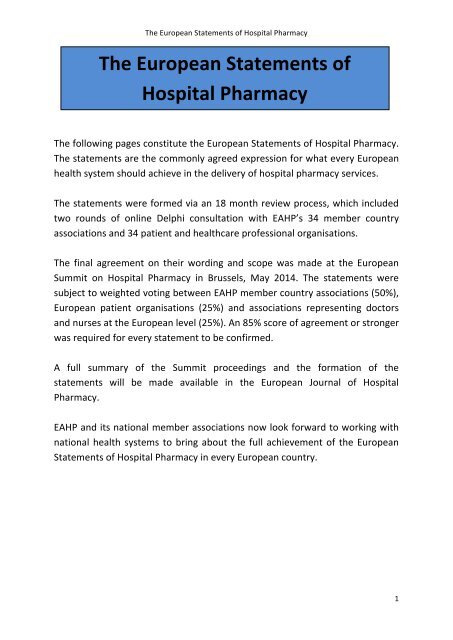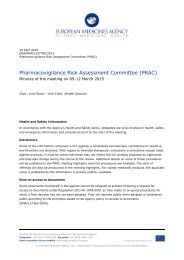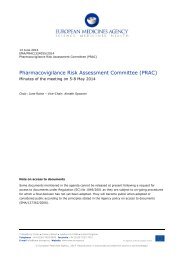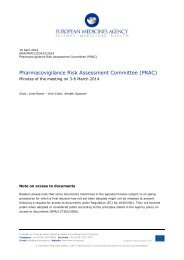European Statements of Hospital Pharmacy
European Statements of Hospital Pharmacy
European Statements of Hospital Pharmacy
Create successful ePaper yourself
Turn your PDF publications into a flip-book with our unique Google optimized e-Paper software.
The <strong>European</strong> <strong>Statements</strong> <strong>of</strong> <strong>Hospital</strong> <strong>Pharmacy</strong> <br />
pr<strong>of</strong>essional perspective <br />
The <strong>European</strong> <strong>Statements</strong> <strong>of</strong> <br />
November 2013 <br />
<strong>Hospital</strong> <strong>Pharmacy</strong> <br />
The following pages constitute the <strong>European</strong> <strong>Statements</strong> <strong>of</strong> <strong>Hospital</strong> <strong>Pharmacy</strong>. <br />
The statements are the commonly agreed expression for what every <strong>European</strong> <br />
health system should achieve in the delivery <strong>of</strong> hospital pharmacy services. <br />
The statements were formed via an 18 month review process, which included <br />
two rounds <strong>of</strong> online Delphi consultation with EAHP’s 34 member country <br />
associations and 34 patient and healthcare pr<strong>of</strong>essional organisations. <br />
The final agreement on their wording and scope was made at the <strong>European</strong> <br />
Summit on <strong>Hospital</strong> <strong>Pharmacy</strong> in Brussels, May 2014. The statements were <br />
subject to weighted voting between EAHP member country associations (50%), <br />
<strong>European</strong> patient organisations (25%) and associations representing doctors <br />
and nurses at the <strong>European</strong> level (25%). An 85% score <strong>of</strong> agreement or stronger <br />
was required for every statement to be confirmed. <br />
A full summary <strong>of</strong> the Summit proceedings and the formation <strong>of</strong> the <br />
statements will be made available in the <strong>European</strong> Journal <strong>of</strong> <strong>Hospital</strong> <br />
<strong>Pharmacy</strong>. <br />
EAHP and its national member associations now look forward to working with <br />
national health systems to bring about the full achievement <strong>of</strong> the <strong>European</strong> <br />
<strong>Statements</strong> <strong>of</strong> <strong>Hospital</strong> <strong>Pharmacy</strong> in every <strong>European</strong> country. <br />
1
The <strong>European</strong> <strong>Statements</strong> <strong>of</strong> <strong>Hospital</strong> <strong>Pharmacy</strong> <br />
Section 1: Introductory <strong>Statements</strong> and Governance <br />
1.1 The overarching goal <strong>of</strong> the hospital pharmacy service is to optimise patient outcomes <br />
through working collaboratively within multidisciplinary teams in order to achieve the <br />
responsible use <strong>of</strong> medicines across all settings. <br />
1.2 At a <strong>European</strong> level, ‘Good <strong>Hospital</strong> <strong>Pharmacy</strong> Practice’ guidelines based on the best <br />
available evidence should be developed and implemented. These guidelines will include <br />
corresponding human resources and training requirements and assist national efforts to <br />
define recognised standards across the scope and levels <strong>of</strong> hospital pharmacy services. <br />
1.3 Health systems have limited resources and these should be used responsibly to optimise <br />
outcomes for patients. <strong>Hospital</strong> pharmacists should develop, in collaboration with other <br />
stakeholders, criteria and measurements to enable the prioritisation <strong>of</strong> hospital pharmacy <br />
activities. <br />
1.4 <br />
All hospitals should have access to a hospital pharmacist who has overall responsibility for <br />
the safe, effective and optimal use <strong>of</strong> medicines. Health authorities should ensure that <br />
each hospital pharmacy is supervised by a pharmacist with appropriate working experience <br />
in the hospital setting, and explicit demonstration <strong>of</strong> competence in hospital pharmacy. <br />
1.5 <strong>Hospital</strong> pharmacists should work with all relevant stakeholders to develop hospital <br />
pharmacy human resource plans covering the breadth <strong>of</strong> hospital pharmacy practice. These <br />
should be aligned to engage hospital pharmacists as supervisors in all steps <strong>of</strong> all medicine <br />
use processes to meet health needs and priorities across public and private sectors that <br />
optimise medicines use and patient outcomes. <br />
1.6 <strong>Hospital</strong> pharmacists should take the lead in coordinating the activities <strong>of</strong> multi-disciplinary,<br />
organisation-‐wide Drug & Therapeutics Committees or equivalent. They should <br />
have appropriate representation as full members <strong>of</strong> these Committees which should <br />
oversee and improve all medicines management policies. <br />
1.7 <strong>Hospital</strong> pharmacists must be involved in the design, specification <strong>of</strong> parameters and <br />
evaluation <strong>of</strong> ICT within the medicines processes. This will ensure that pharmacy services <br />
are integrated within the general Information and Communication Technology (ICT) <br />
framework <strong>of</strong> the hospital including electronic health (eHealth) and mobile health <br />
(mHealth) procedures. <br />
2
The <strong>European</strong> <strong>Statements</strong> <strong>of</strong> <strong>Hospital</strong> <strong>Pharmacy</strong> <br />
Section 2: Selection, Procurement and Distribution <br />
2.1 <strong>Hospital</strong> pharmacists should be involved in the complex process <strong>of</strong> procurement <strong>of</strong> <br />
medicines. They should ensure transparent procurement processes are in place in line <br />
with best practice and national legislation, and based on the principles <strong>of</strong> safety, <br />
quality and efficacy <strong>of</strong> medicines. <br />
2.2 <strong>Hospital</strong> pharmacists should take the lead in developing, monitoring, reviewing and <br />
improving medicine use processes and the use <strong>of</strong> medicine related technologies. <br />
Responsibility for using these processes may rest with other health care pr<strong>of</strong>essionals <br />
and may vary according to the medicine, the medicine related technology, the health <br />
care setting and the multidisciplinary team delivering care. <br />
2.3 <strong>Hospital</strong> pharmacists should coordinate the development, maintenance and use <strong>of</strong> a <br />
medicines formulary system, which may be local, regional and/or national. The <br />
medicine formulary system should be linked to guidelines, protocols and treatment <br />
pathways based on the best available evidence including patient outcomes and <br />
pharmacoeconomic evaluations where these are available. <br />
2.4 Procurement should be according to the medicine formulary and informed by the <br />
formulary selection process. A robust process should also be in place to appropriately <br />
procure medicines not included in the formulary where their use is indicated for the <br />
safe and effective care <strong>of</strong> individual patients. <br />
2.5 Each hospital pharmacy should have contingency plans for shortages <strong>of</strong> medicines that <br />
it procures. <br />
2.6 <strong>Hospital</strong> pharmacies should have responsibility for all medicines logistics in hospitals. <br />
This includes proper storage, preparation, dispensing, distribution and disposal <br />
conditions for all medicines, including investigational medicines. <br />
2.7 <strong>Hospital</strong> pharmacists should be involved in the development <strong>of</strong> policies regarding the <br />
use <strong>of</strong> medicines brought into the hospital by patients. <br />
3
The <strong>European</strong> <strong>Statements</strong> <strong>of</strong> <strong>Hospital</strong> <strong>Pharmacy</strong> <br />
Section 3: Production and Compounding <br />
3.1 Before pharmacy manufacture or preparation <strong>of</strong> a medicine, the hospital pharmacist <br />
should ascertain whether there is a suitable commercially available pharmaceutical <br />
equivalent, and if necessary, discuss the rationale for this decision with the relevant <br />
stakeholders. <br />
3.2 Medicines that require manufacture or compounding must be produced by a hospital <br />
pharmacy, or outsourced under the responsibility <strong>of</strong> the hospital pharmacist. <br />
3.3 Before making a pharmacy preparation, the hospital pharmacist must undertake a <br />
risk assessment to determine the best practice quality requirements. These must <br />
consider premises, equipment, pharmaceutical knowledge and labelling. <br />
3.4 <strong>Hospital</strong> pharmacists must ensure that an appropriate system for quality control, <br />
quality assurance and traceability is in place for pharmacy prepared and compounded <br />
medicines. <br />
3.5 Hazardous medicines should be prepared under appropriate conditions to minimise <br />
the risk <strong>of</strong> contaminating the product and exposing hospital personnel, patients and <br />
the environment to harm. <br />
3.6 When the reconstitution or mixing <strong>of</strong> medicines takes place in a patient care area, a <br />
hospital pharmacist should approve written procedures that ensure staff involved in <br />
these procedures are appropriately trained. <br />
4
The <strong>European</strong> <strong>Statements</strong> <strong>of</strong> <strong>Hospital</strong> <strong>Pharmacy</strong> <br />
Section 4: Clinical <strong>Pharmacy</strong> Services <br />
4.1 <strong>Hospital</strong> pharmacists should be involved in all patient care settings to prospectively <br />
influence collaborative, multidisciplinary therapeutic decision-‐making; they should play a <br />
full part in decision making including advising, implementing and monitoring medication <br />
changes in full partnership with patients, carers and other health care pr<strong>of</strong>essionals. <br />
4.2 All prescriptions should be reviewed and validated as soon as possible by a hospital <br />
pharmacist. Whenever the clinical situation allows, this review should take place prior <br />
to the supply and administration <strong>of</strong> medicines. <br />
4.3 <strong>Hospital</strong> pharmacists should have access to the patients’ health record. Their clinical <br />
interventions should be documented in the patients’ health record and analysed to <br />
inform quality improvement interventions. <br />
4.4 All the medicines used by patients should be entered on the patient’s medical record and <br />
reconciled by the hospital pharmacist on admission. <strong>Hospital</strong> pharmacists should assess <br />
the appropriateness <strong>of</strong> all patients’ medicines, including herbal and dietary supplements. <br />
4.5 <strong>Hospital</strong> pharmacists should promote seamless care by contributing to transfer <strong>of</strong> <br />
information about medicines whenever patients move between and within healthcare <br />
settings. <br />
4.6 <strong>Hospital</strong> pharmacists, as an integral part <strong>of</strong> all patient care teams, should ensure that <br />
patients and carers are <strong>of</strong>fered information about their clinical management options, <br />
and especially about the use <strong>of</strong> their medicines, in terms they can understand. <br />
4.7 <strong>Hospital</strong> pharmacists should inform, educate and advise patients, carers and other <br />
health care pr<strong>of</strong>essionals when medicines are used outside <strong>of</strong> their marketing <br />
authorisation. <br />
4.8 Clinical pharmacy services should continuously evolve to optimise patients’ outcomes. <br />
5
The <strong>European</strong> <strong>Statements</strong> <strong>of</strong> <strong>Hospital</strong> <strong>Pharmacy</strong> <br />
Section 5: Patient Safety and Quality Assurance <br />
5.1 The “seven rights” (the right patient, right medicine, right dose, right route, right time, <br />
right information and right documentation) should be fulfilled in all medicines-‐related <br />
activities in the hospital. <br />
5.2 <strong>Hospital</strong> pharmacists should ensure the development <strong>of</strong> appropriate quality assurance <br />
strategies for medicines use processes to detect errors and identify priorities for <br />
improvement. <br />
5.3 <strong>Hospital</strong> pharmacists should ensure their hospitals seek review <strong>of</strong> their medicines use <br />
processes by an external quality assessment accreditation programme, and act on reports <br />
to improve the quality and safety <strong>of</strong> these processes. <br />
5.4 <strong>Hospital</strong> pharmacists should ensure the reporting <strong>of</strong> adverse drug reactions and <br />
medication errors to regional or national pharmacovigilance programmes or patient safety <br />
programmes. <br />
5.5 <strong>Hospital</strong> pharmacists should help to decrease the risk <strong>of</strong> medication errors by <br />
disseminating evidence-‐based approaches to error reduction including computerised <br />
decision support. <br />
5.6 <strong>Hospital</strong> pharmacists should identify high-‐risk medicines and ensure appropriate <br />
procedures are implemented in procurement, prescribing, preparing, dispensing, <br />
administration and monitoring processes to minimise risk. <br />
5.7 <strong>Hospital</strong> pharmacists should ensure that the medicines administration process is designed <br />
such that transcription steps between the original prescription and the medicines <br />
administration record are eliminated. <br />
5.8 <strong>Hospital</strong> pharmacists should ensure accurate recording <strong>of</strong> all allergy and other relevant <br />
medicine-‐related information in the patient’s health record. This information should be <br />
accessible and evaluated prior to prescription and administration <strong>of</strong> medicines. <br />
5.9 <strong>Hospital</strong> pharmacists should ensure that the information needed for safe medicines use, <br />
including both preparation and administration, is accessible at the point <strong>of</strong> care. <br />
5.10 <strong>Hospital</strong> pharmacists should ensure that medicines stored throughout the hospital are <br />
packaged and labelled so to assure identification, maintain integrity until immediately <br />
prior to use and permit correct administration. <br />
5.11 <strong>Hospital</strong> pharmacists should support and implement systems that allow traceability <strong>of</strong> all <br />
medicines dispensed by the pharmacy. <br />
6
The <strong>European</strong> <strong>Statements</strong> <strong>of</strong> <strong>Hospital</strong> <strong>Pharmacy</strong> <br />
Section 6: Education and Research <br />
6.1 Undergraduate pharmacy curricula should include experience <strong>of</strong> hospital pharmacy <br />
practice. The role <strong>of</strong> all hospital healthcare practitioners, including hospital pharmacists, <br />
should be integrated into the curricula <strong>of</strong> other health pr<strong>of</strong>essionals. <br />
6.2 All those involved in medicines use processes must be able to demonstrate their <br />
competency in their roles. <strong>Hospital</strong> pharmacists should participate in the development <br />
<strong>of</strong> <strong>European</strong>-‐wide competency frameworks to ensure standards <strong>of</strong> best practice are <br />
met. <br />
6.3 A <strong>European</strong>-‐wide framework for initial post graduate education and training in hospital <br />
pharmacy with an assessment <strong>of</strong> individual competence is essential. In addition, <br />
hospital pharmacists should engage in relevant educational opportunities at all stages <strong>of</strong> <br />
their career. <br />
6.4 <strong>Hospital</strong> pharmacists should actively engage in and publish research, particularly on <br />
hospital pharmacy practice. Research methods should be part <strong>of</strong> undergraduate and <br />
postgraduate training programmes for hospital pharmacists. <br />
6.5 <strong>Hospital</strong> pharmacists should be actively involved in clinical trials <strong>of</strong> medicines. <br />
7








